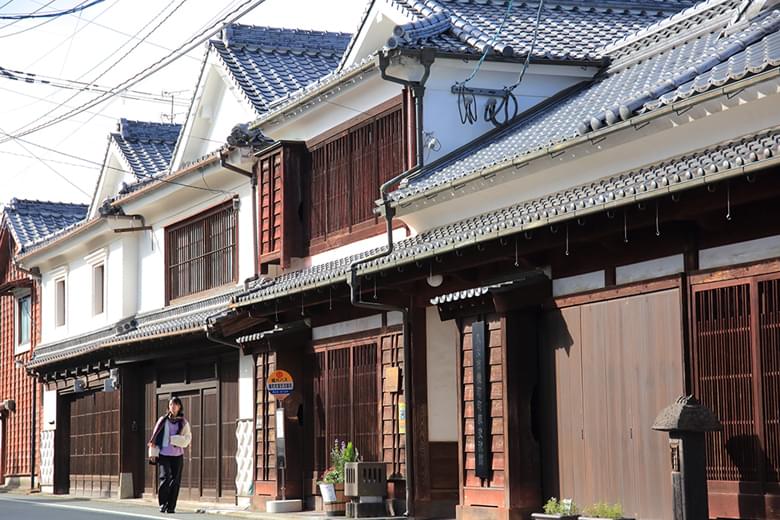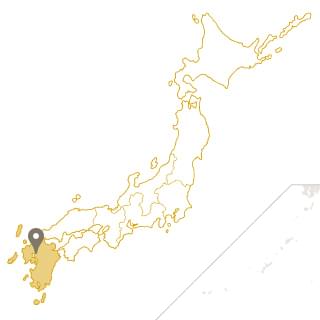Washi paper, lanterns, Buddhist altars, Kurume kasuri, and many other crafts have been made in Yame since ancient times, and these techniques are still being passed down to the next generation. There are many spots where visitors can experience crafts such as making washi paper and touring Kurume Kasuri factories, which is a great opportunity to get a taste of traditional Japanese culture. The Fukushima area in particular has been selected by the national government as an Important Preservation District for Traditional Buildings, and is lined with 150 tasteful machiya townhouses. Walking along the beautiful streets with white walls, you can feel the history of Yame.
Craft Inn Te[té]
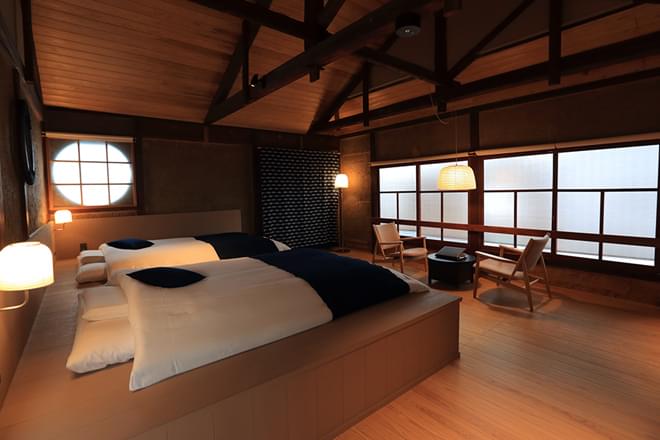
Craft Inn Te[té] was born out of the desire to "actually experience and appreciate the crafts of Kyushu. Three rooms are available, each with a different concept: "indigo," "bamboo," and "Japanese paper". Each room is decorated with beautiful crafts made from these materials. A relaxing chair delicately woven from bamboo, Japanese Washi wallpaper with its unique rough texture, and loungewear made from Kurume tsumugi that is gentle to the skin... As you interact with them, you will notice the delicate techniques and depth of the artisans' craftsmanship.
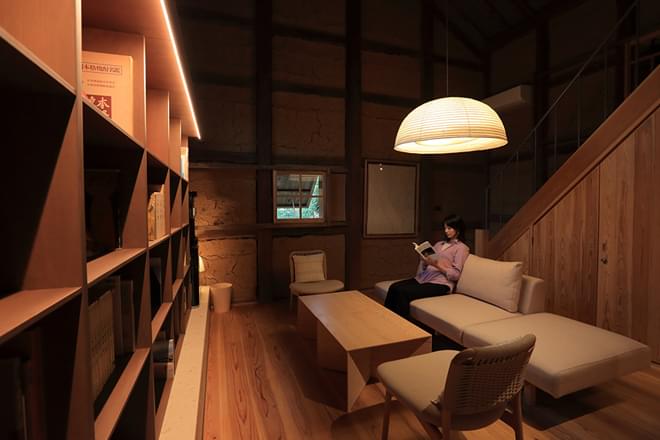
"Washi" room features the beauty of washi, and includes notable features like Japanese Washi paper made from ropes used in the mud walls of the building before its renovation, and woodblock prints printed on Yame Washi paper. There is also a library on the first floor with books on local culture.
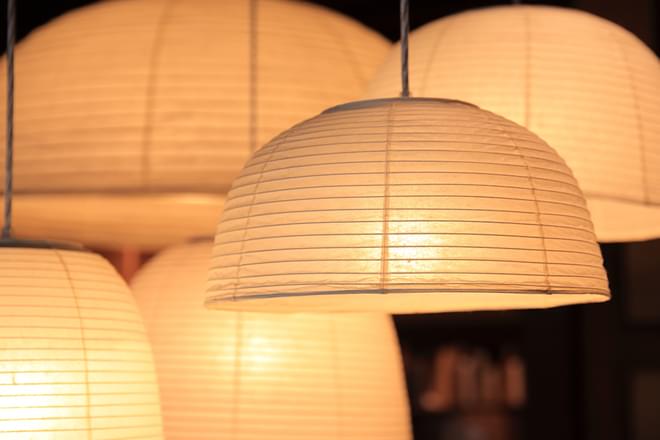
The inn is filled with eye-catching and vivid handicrafts, such as tables made from polished stones from the Chikugo River, and bath pails made by an Okeya (pail maker). Visitors are also guided through hands-on craft activities such as indigo dyeing, Kurume Kasuri weaving, and Japanese paper making.
- Name:
- Craft Inn Té
- Address:
- 120-1 Motomachi, Yame-shi, Fukuoka (Indigo Room, Bamboo Room), 267 Motomachi, Yame-shi, Fukuoka (Washi Room)
- Phone number:
- 0943-25-7577
- Email:
- te@unalabs.jp
Shimogawa Orimono
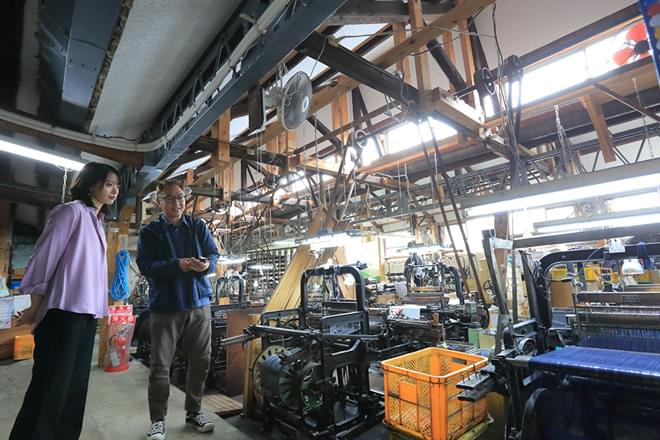
Kasuri is one of the textile techniques called ikat, which is produced in Southeast Asia and other parts of the world. A bundle of threads is tied and dyed in advance, and then woven into a pattern. Beautiful, simple, and warm Kurume Kasuri was invented around 1800 by a girl named Den Inoue, and has been woven for more than 200 years. At Shimokawa Orimono, visitors can observe how Kurume Kasuri is made on a motorized loom and can even try their hand at making a stole with their choice of woven pattern.
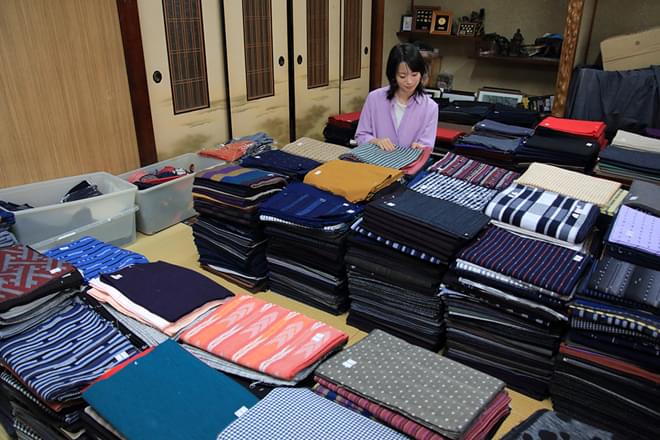
After enjoying a lecture on Kurume Kasuri and a factory tour, visitors can choose from a large stock of fabrics to make their own stoles. The fabrics come in a variety of colors, patterns, and thicknesses. Offcuts, Kasuri products, and fabrics can also be purchased.
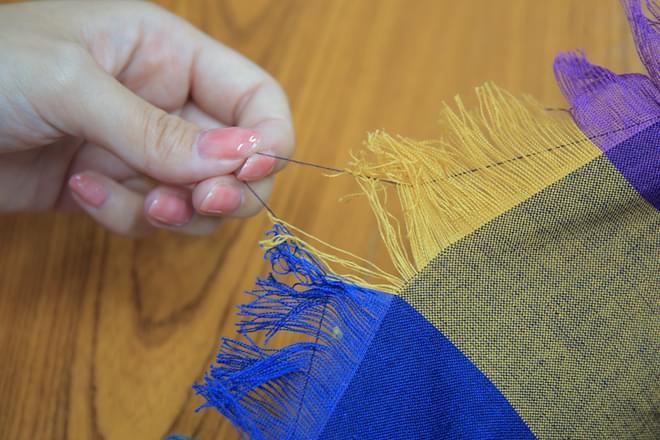
When making a stole, the "ears" of the cloth are trimmed off and the weft threads are pulled out to make fringes. Pulling out one or two threads carefully will produce a beautiful result. Kurume Kasuri is also attractive for its softness and pleasant texture.
- Name:
- Shimokawa Orimono
- Address:
- 1111-2, Tsunoe, Yame-shi, Fukuoka, Japan
- Phone number:
- 0943-22-2427
- Email:
- info@oriyasan.com
- Activities:
- Kurume Kasuri factory tour and Kasuri stole making
Yame Saheho
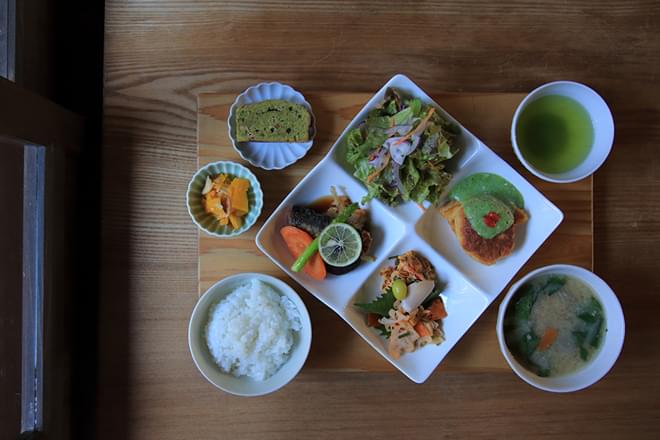
Based on the idea that "food is what builds the body," we offer healthy and colorful dishes. Ingredients are mainly fresh seasonal organic vegetables harvested locally. Seasonings such as miso, soy sauce, and vinegar are made with the finest selection of ingredients and brewed with the utmost care. They are safe for even small children to eat. The prices are reasonable so that customers can enjoy the dishes daily. Each dish is unique and delicious to the last bite.
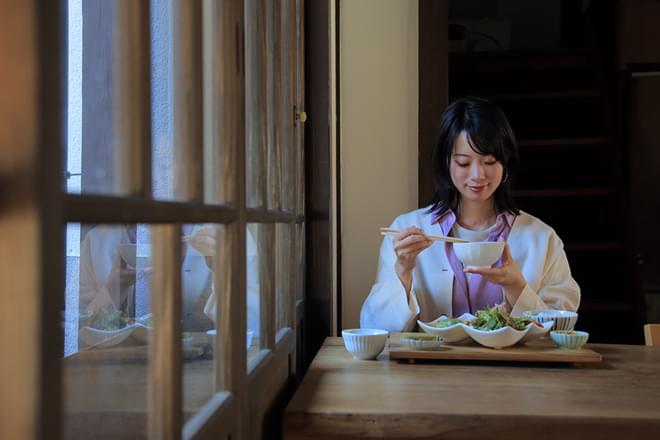
The restaurant also has a pastry chef, and seasonal vegetables such as garland chrysanthemum and pumpkin are used for their sweets. A moderate use of flavoring draws out the sweetness and deliciousness of the vegetables to the fullest. Enjoy vegetables from a different perspective than what you may be familiar with.
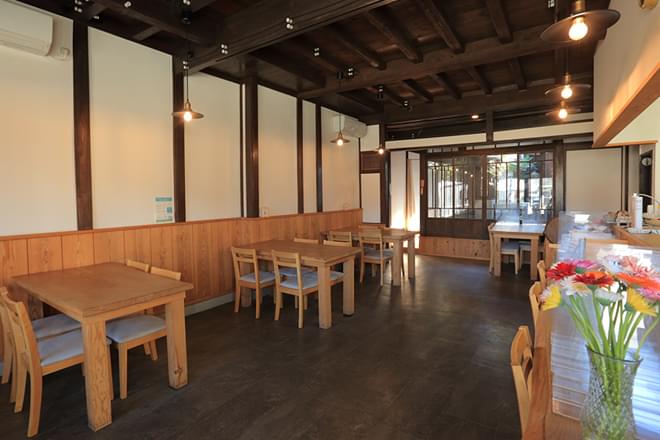
The interior of the renovated 90-year-old townhouse is spacious with high ceilings. The hanging lamps give the space a nostalgic and warm atmosphere. You can enjoy a meal while gazing at the courtyard garden behind the restaurant.
- Name:
- Yame Saheho
- Address:
- 3-1 Motomachi, Yame-shi, Fukuoka
- Phone number:
- 0943-41-0103
- Email:
- info@yamesaheho.com
Unagino Nedoko (Kyu Marubayashi Honke)
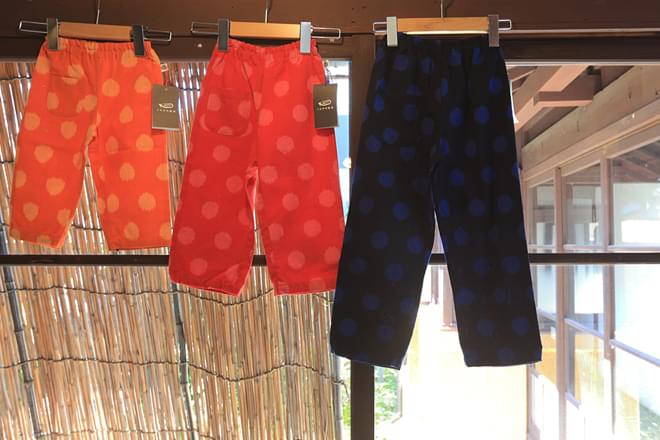
"Unagino Nedoko (eels’ bed)" is a store that promotes the appeal of crafts from Yame and other parts of Japan. At "Kyu Marubayashi Honke (the main house of former Marubayashi family)," work trousers worn in farming villages in the old days are redesigned in a modern style and sold as "MONPE ". In addition to Kurume Kasuri, "MONPE" is a collection of fabrics made from various regions, such as mud-dyed fabrics from Amami, Kagoshima Prefecture, and Banshu-ori fabrics from Hyogo Prefecture. There are two styles: "modern" with a stylish silhouette, and "farmers" with a traditional, relaxed look.
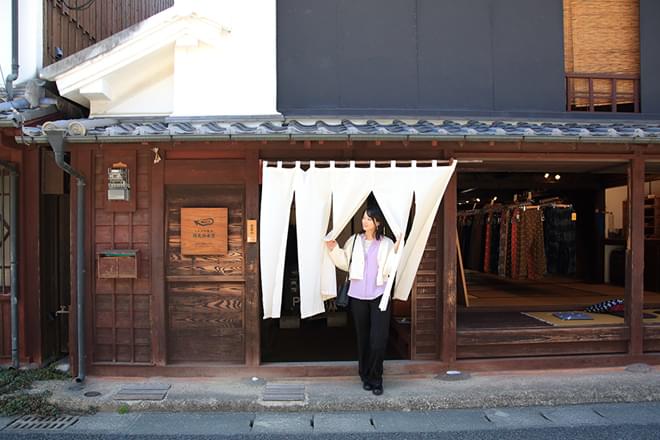
Kyu Marubayashi Honke was renovated from a lantern shop. The second floor used to be a living room, so it has a large window that is a characteristic of "craftsman-style" townhouses. In contrast, "merchant-style" townhouses have two or three single windows because the second floor was used as a warehouse.
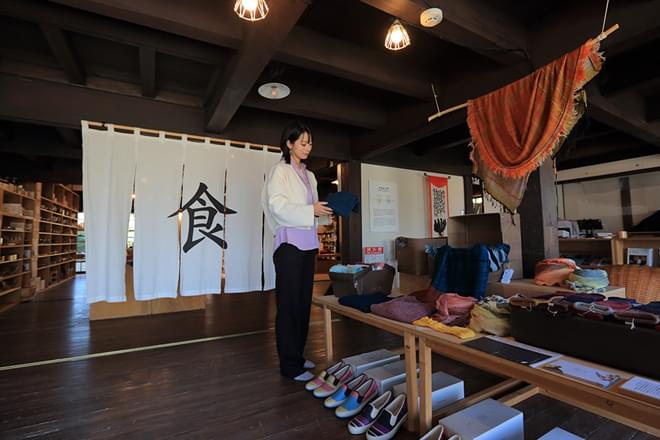
A three-minute walk from "Kyu Marubayashi Honke" is the "Unagino Nedogko, Kyu Terasaki Tei" where you can find crafts from all over Japan such as tableware, cookware, household goods, and toys. All of them have a local flair and a story to tell.
- Name:
- Ubagino Nedoko
- Address:
- 267 Motomachi, Yame-shi, Fukuoka (Kyu Marubayashi Honke), 327 Motomachi, Yame-shi, Fukuoka (Kyu Terasaki Tei)
- Phone number:
- 0943-22-3699 (Kyu Marubayashi Honke), 0943-24-8021 (Kyu Terasaki Tei)
Yabeya Konomi Honke
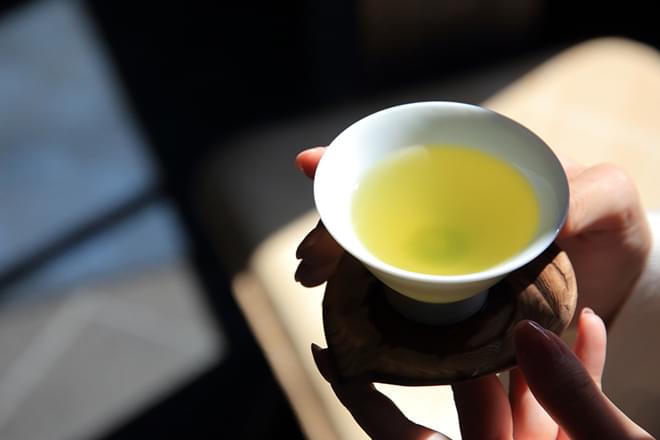
One of Yame's famous specialties is a tea called "Yame-cha", which means tea of Yame. The oldest tea merchant in Kyushu, "Yabeya Konomi Honke" was founded in the early 1700s to deal in mountain products such as kozo (paper mulberry) which is used to make washi paper, as well as lumber and tea. In 1865, the shop became specialized in tea. The tea in Yame is made through a process called "hoiroshiki," in which the tea is carefully roasted on Yame washi paper over a charcoal fire, and has a strong sweet taste and mild aroma. The wide selection of products makes it a perfect souvenir.
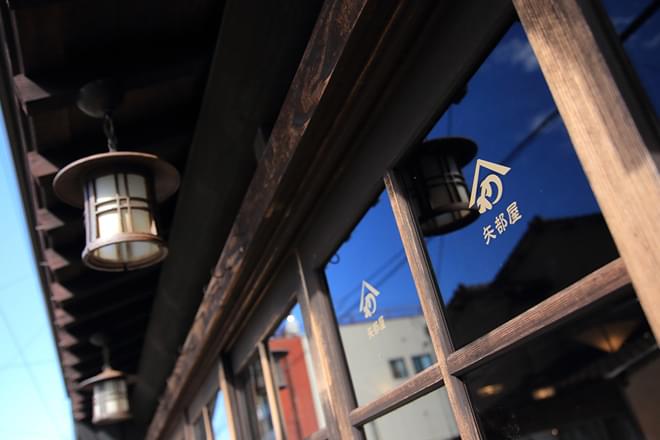
The tasteful store was built in the 1850s. A still-functioning roasting machine, antique tables, a safe, tea urns, and other items unique to a tea wholesaler can be found throughout the store. Take the time to look at them when shopping.
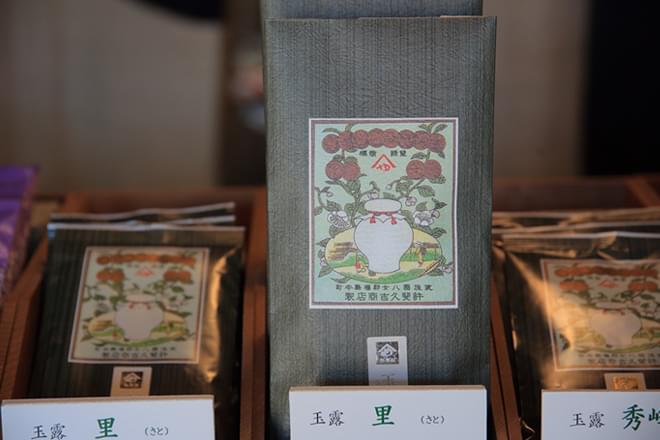
The store offers more than 50 types of tea-related products, making it fun to choose which one you'd like. There is also a full lineup of sweets using Yame-cha, including gyokuro candy in a can (594 yen), matcha crunch chocolate and caramels (540 yen each).
- Name:
- Yabeya Konomi Honke
- Address:
- 126 Motomachi, Yame-shi, Fukuoka, Japan
- Phone number:
- 0943-24-2020
- Email:
- info@konomien.jp
